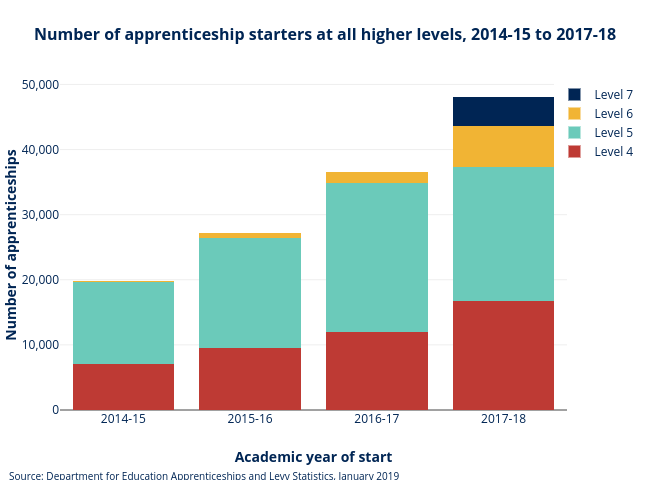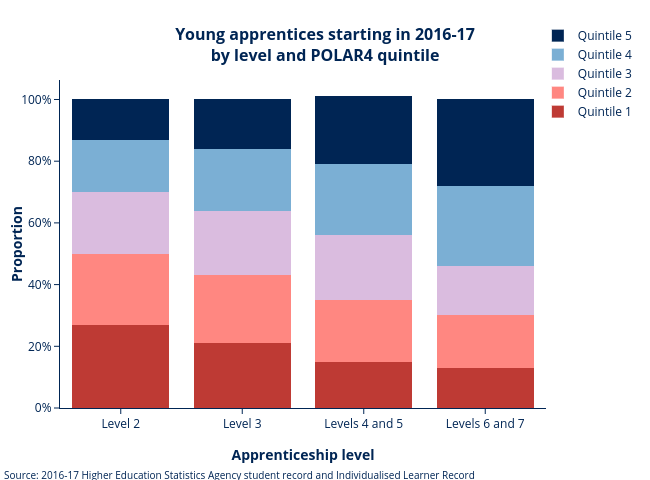Degree apprenticeships: A viable alternative?
Degree apprenticeships provide an alternative route to a higher education qualification, with on-the-job learning and a salary instead of tuition fees. So why is this option so little known? Why do relatively few learners take it up? And can we expect this to change?
- Date:
- 8 March 2019
Read the brief in full
Download the insight brief as a PDF
Evaluation of the Degree Apprenticeship Development Fund
Report to the Office for Students
Introduction
Degree apprenticeships are a relatively new programme offering learners a chance to work in full-time employment while also earning a degree. A degree apprentice’s learning fits around their work commitments, taking up 20 per cent of their working time, and requires flexible learning modes like day or block release, distance or blended learning. Their training costs are covered by their employer and the government, meaning that they pay no tuition fees.
Employers, universities and colleges have welcomed degree apprenticeships as an important means of developing and delivering higher-level skills. Nonetheless, they made up less than 3 per cent of the total number of apprenticeships in 2017-18.
The government has asked the Office for Students (OfS) and the Institute for Apprenticeships and Technical Education to work together to encourage the growth of degree apprenticeships as a means of widening access to higher education for underrepresented groups of people. This is in the context of the government industrial strategy’s wider goal of enabling 3 million learners to start apprenticeships by 2020.
Degree apprenticeships carry the weight of expectations of multiple stakeholders. They are expected, for instance, to meet economic needs and those of employers; to increase social mobility and diversity in higher education; to bridge the gap between different levels of qualifications; to create a new gateway to the professions; and to imbue a vocational route to education with the prestige accorded to more conventional routes.
Some commentators question their value, suggesting they are just an alternative approach for learners who would have attended university anyway. Others point to barriers which processes for accreditation and funding present to their development.
This Insight brief looks at the available evidence, including the independent evaluation of the Degree Apprenticeship Development Fund, to consider how far degree apprenticeships are meeting these expectations, report on what is working and identify where further development is needed.
Key points
- At present, numbers of degree apprentices are very low, but are expected to increase considerably, including in public sector jobs.
- Degree apprenticeships benefit both school leavers from disadvantaged backgrounds and mature learners already in the workforce, potentially increasing social mobility.
- The OfS promotes degree apprenticeships through our access and participation work, includes them in the scope of our targets and investment, and encourages them through our guidance and support.
- We hope through this work to build progression pathways from lower-level apprenticeships to those at degree level, to remove barriers for underrepresented groups, and to ensure value for money for all learners.
- We are also engaging with other regulators with the aim of removing barriers posed by the complexity of arrangements for funding, regulation and the approval of new apprenticeship standards.
Explore the data in this brief
|
Framework or standard |
Level |
Numbers |
|
Chartered manager |
6 (degree) |
2,315 |
|
Digital and technology solutions professional |
6 (degree) |
1,310 |
|
Chartered surveyor |
6 (degree) |
815 |
|
Registered nurse |
6 (degree) |
305 |
|
Civil engineer |
6 (degree) |
160 |
|
Healthcare science practitioner |
6 (degree) |
110 |
|
Manufacturing engineer |
6 (degree) |
105 |
|
Product design and development engineer |
6 (degree) |
100 |
|
Embedded electronic systems design and development engineer |
6 (degree) |
95 |
|
Aerospace engineer |
6 (degree) |
85 |
|
Nuclear scientist and nuclear engineer |
6 (degree) |
80 |
|
Food industry technical professional |
6 (degree) |
75 |
|
Building services design engineer |
6 (degree) |
65 |
|
Electrical or electronic technical support engineer |
6 (degree) |
55 |
|
Control or technical support engineer |
6 (degree) |
25 |
|
Laboratory scientist |
6 (degree) |
25 |
|
Construction management |
6 (degree) |
20 |
|
Aerospace software development engineer |
6 (degree) |
10 |
|
Broadcast technology higher apprenticeship (BBC) |
6 (degree) |
10 |
|
Non-destructive testing engineer |
6 (degree) |
5 |
|
Chartered legal executive |
6 |
185 |
|
Senior insurance professional |
6 |
120 |
|
Relationship manager (banking) |
6 |
105 |
|
Senior compliance or risk specialist |
6 |
85 |
|
Financial services professional |
6 |
55 |
|
Licensed conveyancer |
6 |
35 |
|
Teacher |
6 |
15 |
|
Senior leader |
7 (degree) |
550 |
|
Accountancy or taxation professional |
7 |
3,710 |
|
Solicitor |
7 |
105 |
|
Postgraduate engineer |
7 |
95 |
|
Systems engineering |
7 |
30 |
|
Academic professional |
7 |
5 |
Links to data
Describe your experience of using this website


